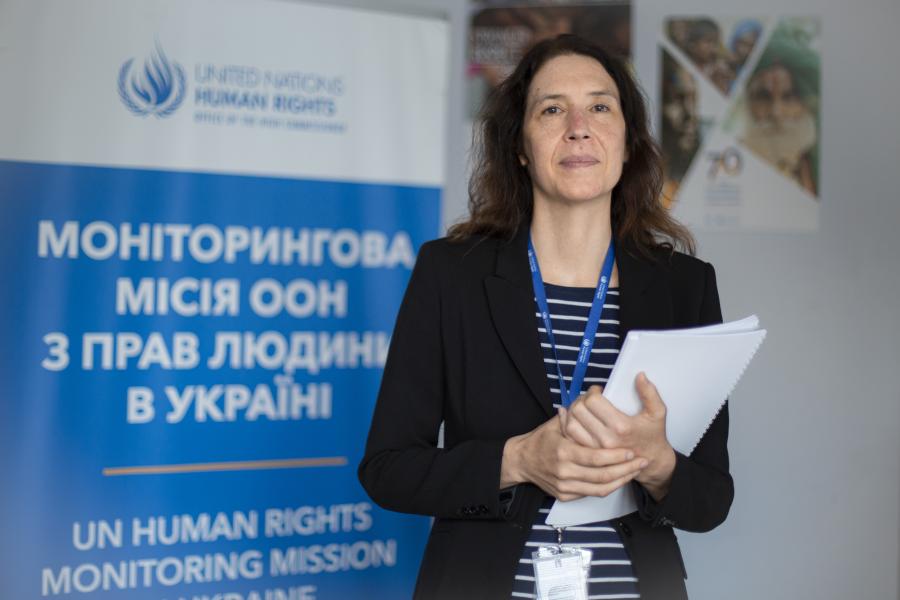Conflict-related arbitrary detention, torture and ill-treatment in Ukraine must stop, says the new UN Human Rights Report
02 July 2021
- The armed conflict in eastern Ukraine continues to be marred by arbitrary detention, torture and ill-treatment on both sides of the contact line , says a new thematic report of the Office of the United Nations High Commissioner for Human Rights (OHCHR) published today. It highlights that while the scale of these practices has substantially decreased since 2016 on both sides of the contact line, concrete action must be urgently taken to eradicate them, bring perpetrators to justice and provide victims with remedy and reparation (1).
“The prohibition of torture and other cruel, inhuman or degrading treatment is absolute. Torture can never be justified,” said Matilda Bogner, Head of the UN Human Rights Monitoring Mission in Ukraine (HRMMU). “Seven years since the outbreak of the conflict, it is unacceptable that such egregious human rights violation remain largely unaddressed,” Ms Bogner added.

The new report is based on analysis of over 1,300 individual cases of conflict-related arbitrary detention, including secret and incommunicado detention, and torture and ill-treatment, as well as conflict-related sexual violence, perpetrated by Government actors and by armed groups and other actors in territory controlled by self-proclaimed ‘Donetsk people’s republic’ and self-proclaimed ‘Luhansk people’s republic’ (2) documented by HRMMU from 2014 to 2021.
The report sets out the scale of conflict-related detention as well as the prevalence and patterns of conflict-related arbitrary detention, and torture and ill-treatment on both sides of the contact line. It also covers the issue of accountability for violations, including remedy to victims. The report also presents two emblematic cases of places of detention where such violations occurred, in the Kharkiv regional department of the Security Service of Ukraine until 2016 (Annex I) and in the ‘Izoliatsiia’ detention facility in armed group-controlled Donetsk to date (Annex II).
The report estimates that around 4,000 conflict-related detainees suffered torture and ill-treatment from 2014 to 2021 (approx. 3,400 men and approx. 600 women), including an estimated 340 victims of sexual violence. Approximately 1,500 cases were perpetrated by Government actors and approximately 2,500 by armed groups and other actors in territory controlled by self-proclaimed ‘republics’, according to the report.
From the beginning of the armed conflict, conflict-related detainees faced torture and ill-treatment by Government actors as well as armed groups and other actors in territory controlled by self-proclaimed ‘republics’. However, the report finds that torture and ill-treatment became less common on both sides of the contact line after 2016. Despite this, arbitrary detention, torture and ill-treatment continues to occur on both sides of the contact line and is systematically carried out in some places of detention in in territory controlled by self-proclaimed ‘republics’.
The report highlights that both in Government-controlled territory and in territory controlled by self-proclaimed ‘republics’, torture and ill-treatment, including conflict-related sexual violence, were used to extract confessions or information, as well as to humiliate and intimidate, and to extort money and property.
According to the report, the most common Government entity responsible for these violations was the Security Service of Ukraine (SBU) as well as volunteer battalions at the initial stages of the conflict. In territory controlled by self-proclaimed ‘republics’, the main perpetrators of arbitrary detention, torture and ill-treatment at the initial stages of the conflict were various armed groups, and later, members of the ‘ministries of state security’.
The report highlights the prevailing impunity for perpetrators due to a lack of effective investigations into allegations of arbitrary detention, torture and ill-treatment, including conflict-related sexual violence. This means that the right of victims to remedy and reparation for harm suffered remains largely unfulfilled.
“We have observed a lack of political will and motivation to investigate the cases allegedly perpetrated by Government actors, as well as misuse of procedures to avoid proper investigation of such cases,” explained Ms Bogner. “While we can count victims in the thousands, perpetrators brought to account only number in the dozens,” she added.
The report also provides recommendations addressed to the Government of Ukraine, self-proclaimed ‘republics’ and the international community on measures that need to be taken to stop ongoing violations, ensure accountability and adopt measures to prevent future violations.
In particular, the report urges the Government to effectively and promptly investigate the cases, regardless of the affiliation of the alleged perpetrator as well as put in place effective mechanisms of remedy for victims. It also urges self-proclaimed ‘republics’ to release all those arbitrarily detained without delay; to treat all persons deprived of their liberty humanely and according to international human rights and humanitarian law standards and to grant unimpeded confidential access to OHCHR and other independent international monitors to all places of detention, including to the ‘Izoliatsiia’ detention facility.
The full report is available in English, Ukrainian and Russian.
For more information or media enquiries, please contact Tanya Tesliuchenko at +380503868069 or e-mail ttesliuchenko@ohchr.org
(1) Cases of arbitrary detention, torture and ill-treatment in the Autonomous Republic of Crimea and the city of Sevastopol, Ukraine, occupied by the Russian Federation, are covered in the report of the United Nations Secretary-General, scheduled for presentation at the session of the Human Rights Council on 9 July [https://undocs.org/A/HRC/47/58].
(2) Referred to as ‘Donetsk people’s republic’ and ‘Luhansk people’s republic’ or jointly as self-proclaimed ‘republics’.


